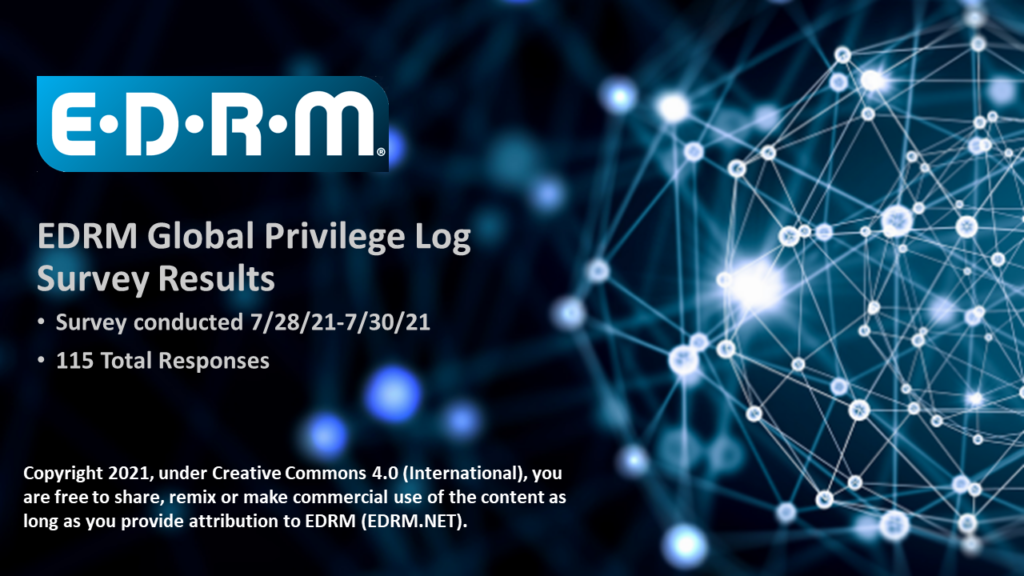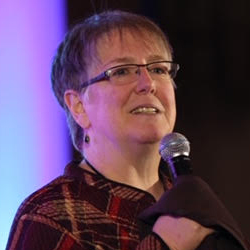
Cristin Traylor, Project Trustee of the EDRM Privilege Log Project submitted the following in response to a request for comments to the Discovery Subcommittee of The Judicial Conference Advisory Committee on Civil Rules, on whether to change FRCP 26(b)(5)(A).
Dear Members of the Discovery Subcommittee of the Advisory Committee:
This is in response to your request for comments to the Discovery Subcommittee of The Judicial Conference Advisory Committee on Civil Rules, on whether to change FRCP 26(b)(5)(A). We are submitting these comments on behalf of the EDRM Privilege Log Team. As you may be aware, EDRM is a volunteer multidisciplinary organization that includes lawyers (some of whom primarily represent plaintiffs and some of whom primarily represent defendants), as well as current and former judges, and other legal professionals (including paralegals, e-discovery analysts, IT, privacy, security, information governance and other professionals).
We have two current contributions for your Subcommittee’s consideration:
1. The EDRM Streamlined Privilege Protocol
There is a broad consensus among litigation attorneys and judges that current practices for privilege logging are not optimal for many cases. In cases with large productions and a significant number of privileged documents, the traditional preparation of privilege logs is burdensome, time consuming, and frequently not particularly useful for requesting parties to evaluate the privilege claims. In response to these concerns, the EDRM Privilege Log Team drafted the attached Privilege Log Protocol, aimed at reducing costs and burdens for producing parties while providing more useful information for receiving parties. That includes broader use of FRE 502(d) non-waiver orders, advance identification of “gray area” issues, removing any need to log certain kinds of documents (including those prepared after the litigation begins and documents produced in redacted form), and reliance on metadata-generated logs for electronic documents, but with an opportunity for the receiving party to request and obtain additional information about a sample of documents they select, to help them evaluate and test the overall accuracy of privilege determinations. The protocol also encourages more communications between parties, and the use of Special Masters to resolve any privilege issues the parties are unable to resolve themselves, with courts able to apportion costs based on whether the privilege claims and challenges are substantially justified.
The EDRM Privilege Log Protocol was presented to a panel of judges at last November’s Georgetown Advanced E-Discovery Conference and received unanimous “buy-in” from the four Federal District Judges and Magistrate Judges who volunteered to review new/innovative ideas as part of that program.
We recommend that the Discovery Subcommittee consider revising Rule 26(b)(5)(A), or the comments thereto, to incorporate some or all of the principles reflected in the EDRM Privilege Log Protocol, and to encourage the use of such protocols.
2. The EDRM Privilege Log Survey
In order to obtain more systematic feedback from practitioners about privilege procedures, and potential amendment of Rule 26(b)(5)(A), we surveyed EDRM participants with regard to their views and experiences and also made the survey available to the public via social media over a three-day period. To date, 115 professionals have responded to the survey, and we have summarized those results below.
Demographics
The vast majority of the respondents were located in the United States, and the roles were almost evenly split between attorneys and other legal professionals. Large law firms were approximately half of the attorney respondents, with the other half coming from a mix of medium law firms, small law firms, in-house legal departments, ALSPs/consultants, government and other organizations. Half of the respondents primarily represent producing parties, while the other half represent both producing and requesting parties. 75% primarily represent business entities. Seven respondents primarily represent requesting parties, and only 6 primarily represent individuals.
Summary
Although 70% of the respondents support amendment of Rule 26(b)(5)(A), the vast majority believe that a privilege log in some format (including alternatives to document-by-document logs with manually drafted descriptions) generally improves accountability about privilege determinations. There were a mix of responses as to whether privilege logs have led to disclosures that actually impacted the outcome of a matter or were used as trial exhibits. Interestingly, 63% of respondents are already using “metadata only” privilege logs in their matters and 88% said that parties have been willing to negotiate alternatives. The respondents themselves were overwhelmingly in favor of a protocol such as the EDRM Privilege Log Protocol, that starts with a metadata log and then allows the requesting party to obtain more information about a sample of documents. The write-in comments contain a number of helpful suggestions about issues to consider, including threading, redacted documents, name normalization, and whether privilege logs should be created in the first instance.
To the extent more data is helpful to your deliberations, we have included the total results of the survey to date.
All the referenced materials are included in the attached zip file. [Editor’s note: download the survey results here.]
We hope this information is helpful to the analysis that the Discovery Subcommittee currently is undertaking. If we can be of further assistance in your further deliberations, please do not hesitate to be in touch.
Best,
Cristin Traylor, Chair of the EDRM Privilege Log Committee


